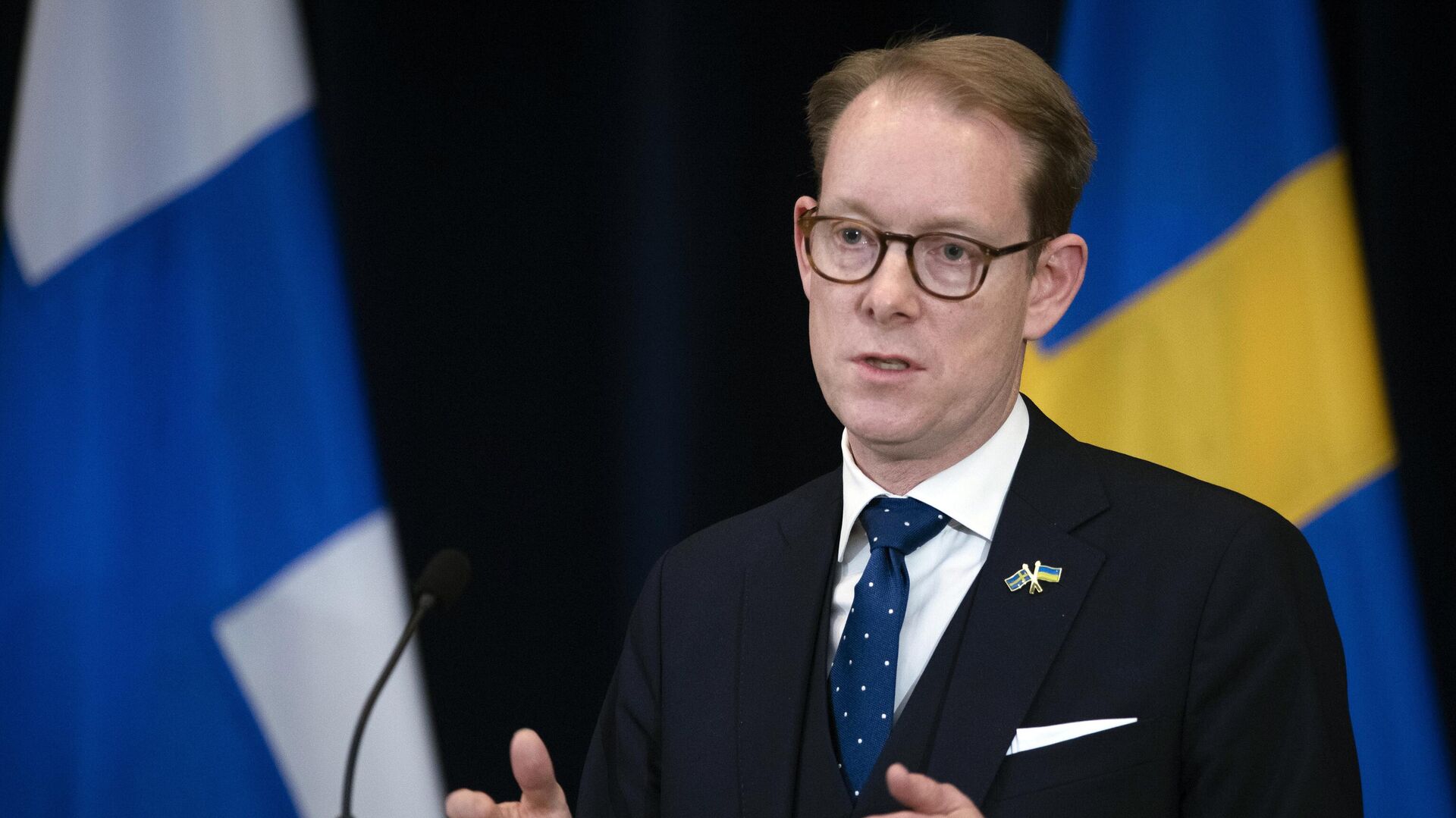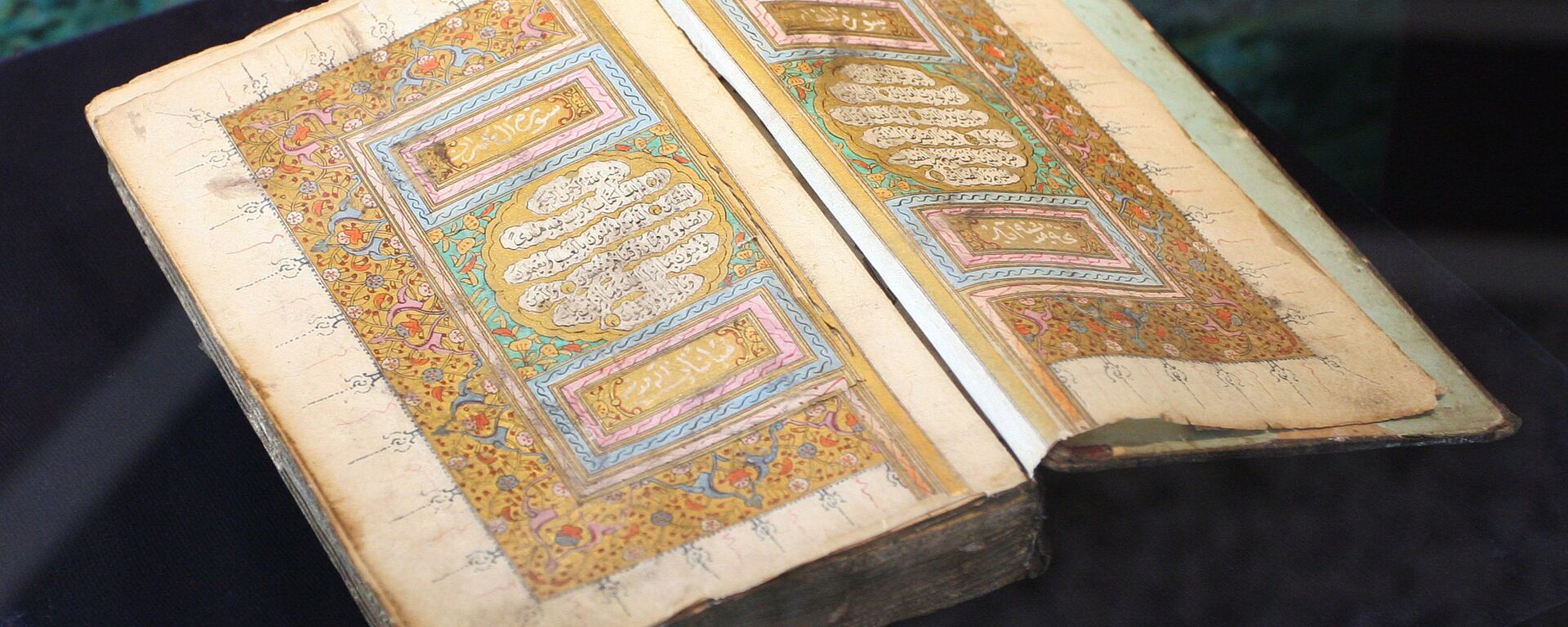https://sputnikglobe.com/20230703/sweden-belatedly-denounces-quran-burning-after-international-backlash-1111632481.html
Sweden Belatedly Denounces Quran-Burning After Global Backlash
Sweden Belatedly Denounces Quran-Burning After Global Backlash
Sputnik International
Sweden's shifting attitudes toward Quran-burning illustrate a diplomatic tightrope between respect for free speech and religious sentiments and foreign policy considerations.
2023-07-03T05:21+0000
2023-07-03T05:21+0000
2023-07-03T07:43+0000
world
rasmus paludan
ulf kristersson
sweden
stockholm
jeddah
organization of islamic cooperation (oic)
swedish foreign ministry
islam
quran
https://cdn1.img.sputnikglobe.com/img/07e7/03/07/1108161560_0:0:3067:1725_1920x0_80_0_0_0c228875fae39072ada42e3067b7bfc4.jpg
The Swedish Foreign Ministry has condemned the recent Quran-burning on the first day of Islamic holiday Eid al-Adha, which sparked ire across the Muslim world, as "Islamophobic acts committed by individuals at demonstrations in Sweden."The Foreign Ministry further called the desecration of the Quran, or any other holy scripture, an "offensive and disrespectful act and a clear provocation," which "in no way reflects the views of the Swedish government."Lastly, it stressed that "expressions of racism, xenophobia and related intolerance have no place in Sweden or elsewhere in Europe."The somewhat belated condemnation came amid a massive backlash over the incendiary demonstration. Among others, the Organization of Islamic Cooperation, a 57-member body headquartered in Jeddah, Saudi Arabia, held a special crisis meeting, calling for measures to avoid and prevent further desecration of the Quran and concluding that international law must be used to stop religious hatred.OIC Secretary General Hissein Brahim Taha stressed the need to send a clear message that acts of desecration against the Quran are "not mere ordinary Islamophobia incidents." Following what he referred to as "despicable act" in Stockholm, he called for a stricter application of international law to prohibit the promotion of religious hatred.This condemnation echoed widespread denunciations that have included demonstrations near the Swedish embassy in the Iraqi capital, while Iraq, Kuwait, the United Arab Emirates and Morocco summoned Swedish envoys in protest.Furthermore, Iranian Foreign Minister Hossein Amirabdollahian tweeted on Sunday that his country would refrain from sending Tehran's new ambassador to Sweden, Hojjatollah Faghani, in protest against the Swedish government's permission to burn the Quran.The Quran burning outside Stockholm's main mosque last Wednesday followed a similar incident in January in which Rasmus Paludan, the leader of the fringe, right-wing Hard Line party, burned a copy of the holy book outside the Turkish Embassy in the Swedish capital, which further exacerbated tensions with Turkiye and cast a shadow of doubt over Sweden's NATO bid that hinges on Ankara's approval.The latest incident illustrates Sweden's conundrum with considerations of free speech, religious tolerance and political gain all weighed against each other. Perhaps, indicative of Sweden's shaky and ambiguous position, the country's Prime Minister Ulf Kristersson commented on the police decision, saying it was "legal but inappropriate."
https://sputnikglobe.com/20230702/iran-suspends-appointing-new-sweden-envoy-over-quran-burning-in-nordic-country-1111618851.html
sweden
stockholm
jeddah
Sputnik International
feedback@sputniknews.com
+74956456601
MIA „Rossiya Segodnya“
2023
News
en_EN
Sputnik International
feedback@sputniknews.com
+74956456601
MIA „Rossiya Segodnya“
Sputnik International
feedback@sputniknews.com
+74956456601
MIA „Rossiya Segodnya“
quran-burining in sweden, foreign policy repercussions, international backlash, muslim holiday eid al-adha,
quran-burining in sweden, foreign policy repercussions, international backlash, muslim holiday eid al-adha,
Sweden Belatedly Denounces Quran-Burning After Global Backlash
05:21 GMT 03.07.2023 (Updated: 07:43 GMT 03.07.2023) Sweden has long grappled over whether to allow demonstrations that feature Quran-burning in a diplomatic tightrope between respect for free speech, protection of religious sentiments and foreign policy considerations.
The Swedish Foreign Ministry has condemned the recent Quran-burning on the first day of Islamic holiday Eid al-Adha, which sparked ire across the Muslim world, as "Islamophobic acts committed by individuals at demonstrations in Sweden."
The Foreign Ministry further called the desecration of the Quran, or any other holy scripture, an "offensive and disrespectful act and a clear provocation," which "in no way reflects the views of the Swedish government."
Lastly, it stressed that "expressions of racism, xenophobia and related intolerance have no place in Sweden or elsewhere in Europe."
The somewhat belated condemnation came amid a
massive backlash over the incendiary demonstration. Among others, the Organization of Islamic Cooperation, a 57-member body headquartered in Jeddah,
Saudi Arabia, held a special crisis meeting, calling for measures to avoid and prevent further desecration of the Quran and concluding that international law must be used to stop religious hatred.
OIC Secretary General Hissein Brahim Taha stressed the need to send a clear message that acts of desecration against the Quran are "not mere ordinary Islamophobia incidents." Following what he referred to as "despicable act" in Stockholm, he called for a stricter application of international law to prohibit the promotion of religious hatred.
This condemnation echoed
widespread denunciations that have included demonstrations near the Swedish embassy in the Iraqi capital, while Iraq, Kuwait, the United Arab Emirates and Morocco
summoned Swedish envoys in protest.
Furthermore, Iranian Foreign Minister Hossein Amirabdollahian tweeted on Sunday that his country would refrain from sending Tehran's new ambassador to Sweden, Hojjatollah Faghani, in protest against the Swedish government's permission to burn the Quran.
The Quran burning outside Stockholm's main mosque last Wednesday followed a similar incident in January in which
Rasmus Paludan, the leader of the fringe, right-wing Hard Line party,
burned a copy of the holy book outside the Turkish Embassy in the Swedish capital, which further exacerbated tensions with Turkiye and cast a shadow of doubt over Sweden's NATO bid that
hinges on Ankara's approval.
Since then, the Swedish authorities have rejected several other requests to hold Quran-burning demonstrations, in addition Sweden's security apparatus raised alarm that such acts would pose heightened security risks and endanger embassies abroad. However, a Swedish court in April overturned the police's decision, stressing the lack of sufficient evidence against holding such protests. The Swedish police subsequently approved the demonstration in line with free speech protections, but the authorities later said they had opened an investigation over "agitation against an ethnic group."
The latest incident illustrates Sweden's
conundrum with considerations of free speech, religious tolerance and political gain all weighed against each other. Perhaps, indicative of Sweden's shaky and ambiguous position, the country's Prime Minister
Ulf Kristersson commented on the police decision, saying it was "legal but inappropriate."



